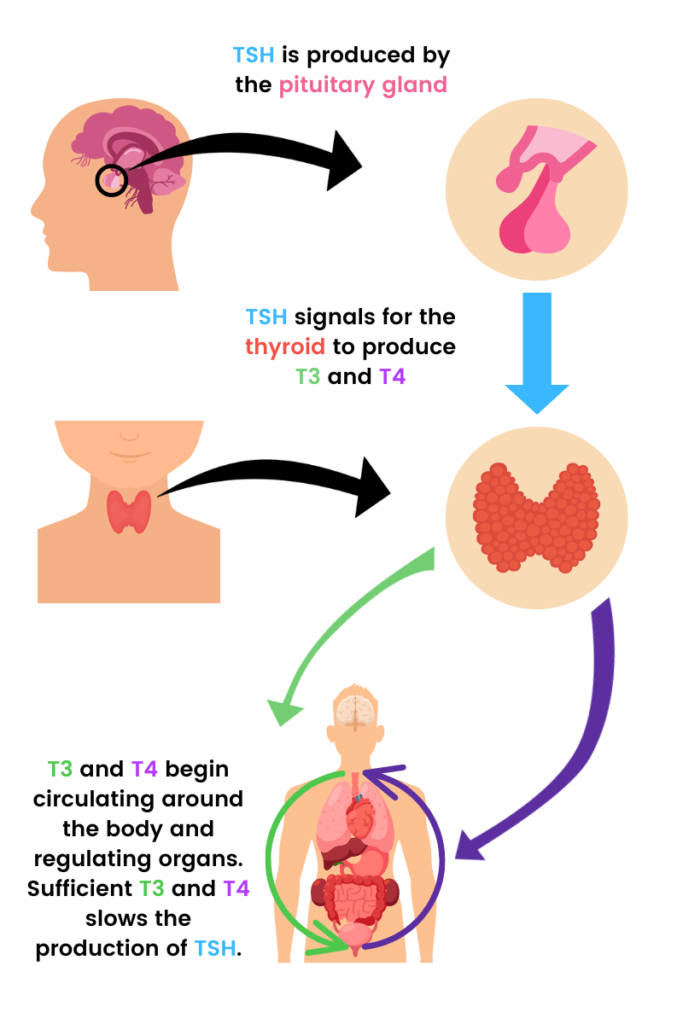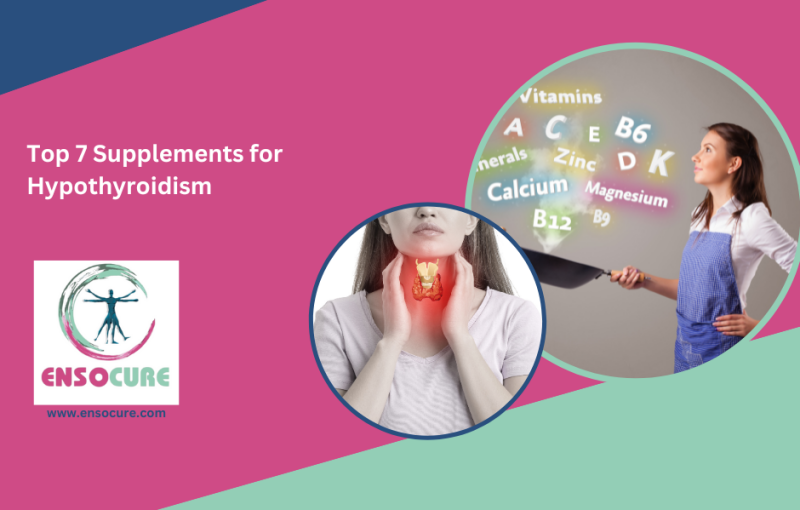Hypothyroidism occurs when the thyroid gland fails to produce sufficient thyroid hormones, particularly thyroxine (T4) and triiodothyronine (T3). In its early phases, hypothyroidism may not cause noticeable symptoms, but untreated hypothyroidism can lead a slowdown of the body’s metabolic processes causing health issues, like elevated cholesterol and cardiac problems, over time. However, in the early subclinical stages of hypothyroidism, healthy lifestyle and management of thyroid health could restore the function of your thyroid. There are various supplements for hypothyroidism, but some are proven to be especially useful in thyroid health.
CAUSES of Hypothyroidism
Hashimoto’s thyroiditis: A common cause, HT is an autoimmune condition where the immune system attacks the thyroid gland.
Other Causes: Thyroid surgery, radiation therapy, certain medications, thyroiditis or inflammation of the thyroid gland and congenital thyroid disorders.
Pituitary Gland Disorder: A rare condition where the pituitary gland fails to make enough thyroid-stimulating hormone (TSH). This could be due to a noncancerous tumor of the pituitary gland.

Lack of Iodine. The thyroid gland needs iodine to produce thyroid hormones. Iodine is found mainly in seafood, seaweed, plants grown in iodine-rich soil and iodized salt. Insufficient intake of iodine, or iodine deficiencies can lead to hypothyroidism. Excess iodine can worsen hypothyroidism in those already having the condition.
SYMPTOMS
- Fatigue and weakness
- Weight gain
- Cold intolerance
- Dry skin and hair
- Constipation
- Depression and mood changes
- Muscle aches and joint pain
- Memory and concentration problems
- Heavy or irregular Menstrual cycles
PHYSICAL SIGNS
- Swelling of the thyroid gland (goiter)
- Puffy face
- Slow heart rate (bradycardia)
Complications
Diagnosis of Hypothyroidism
Hypothyroidism is usually diagnosed through blood tests known as a thyroid function test that measure thyroid hormone levels, particularly TSH (thyroid-stimulating hormone) T3 and T4. Your doctor might also recommend a Free triiodothyronine (FT3) and Free Thyroxine (T4 ) test which is a better indicator of thyroid function. In the case of suspected Hashimoto’s, a further anti TPO test will be recommended to test for anti-thyroid peroxidase (TPO) and anti-thyroglobulin antibodies, can help identify autoimmune thyroid conditions.
Supplements for Hypothyroidism
While the standard treatment of hypothyroidism usually requires oral hormone replacement through synthetic thyroid hormone medication (levothyroxine), in some cases, your doctor might also want to adopt a watch and wait approach to see if your thyroid returns to normal. This is especially when your test results show normal FT3 and FT4 levels with an elevated TSH between 4-10 mIU/L (milli-international units per liter). Called subclinical hypothyroidism, it could be asymptomatic or exhibit few symptoms not detrimental to health.
A stressed out and dysfunctional thyroid could be due to several factors such as poor lifestyle habits, stress, lack of sleep, hormonal disruption, lack of iodine and medication. A healthy diet, exercise, adequate sleep, de-stressing techniques and supplements for hypothyroidism could well bring your thyroid back on track. Subclinical hypothyroidism requires constant monitoring of thyroid level, function, and symptoms. Here are 7 supplements for hypothyroidism scientifically proven to contribute to thyroid health.
1. Zinc
Zinc contributes to over 100 enzymatic reactions in the body, protein and DNA synthesis, growth and development, and tissue healing. It is not stored in the body which means we need to get zinc from diet and supplements. A zinc deficiency is common in those with hypothyroidism especially in Hashimoto’s. Correcting a zinc deficiency can help restore your immune system and improve thyroid function by reducing TSH levels. When combined with selenium supplements, zinc may further reduce oxidative stress damage to your thyroid. The highest sources of zinc are Oysters, meat, lentils, and pumpkin seeds.
2. Selenium
Selenium is an essential mineral with powerful antioxidant properties that protects the thyroid gland from oxidative stress. It regulates the immune system and prevents tissue damage in the thyroid. Your cells need selenium to convert T4 to T3. Regular intake of selenium supplements decreases thyroid peroxidase (TPO) antibodies, which, when present, indicates Hashimoto’s, an autoimmune form of hypothyroidism. The best natural sources of selenium are seafood, meat, eggs, Brazil nuts, oatmeal, canned beans, and cottage cheese
3. Tyrosine
Tyrosine an amino acid increases norepinephrine in the brain to induce thyrotropin-releasing hormone neurons. This in turn releases more thyroid-stimulating hormone. As a result, the synthesis and release of thyroid hormones increase. During the thyroid hormone process, tyrosine is absorbed through diet and created by the conversion of another amino acid phenylalanine. Tyrosine then combines with active or oxidized iodine to form thyroid hormones monoiodotyrosine (T1), and diiodotyrosine (T2). T1 and T2 again combine to form T3 and T4 the main thyroid hormones. Rich sources of Tyrosine are: Fish, chicken, meat, Horsegram, pumpkin seeds, white beans, and milk
4. Vitamin D 3
Vitamin D3 contributes to strengthening bones, moderating cell growth, regulating the immune system, and supporting the thyroid by converting the T4 into necessary T3. Vitamin D3 can reduce inflammation and heal leaky gut, a symptom significant to people with Hashimoto’s. Studies between Vitamin D3 and the thyroid have also shown how Vitamin D3 reduces TSH and exerts an influence on Dio2, the enzyme necessary for the conversion of T4 into T3. While supplementation of Vitamin D3 can be taken, the best source of Vitamin D3 is sunshine. However, people with thyroid problems require more vitamin D3 which is when supplements are required, but the dosage and amount is best suggested by a doctor.
5. Magnesium
Magnesium contributes to vital functions, including digestion, blood glucose regulation and metabolism, over 300 enzyme reactions involved with protein synthesis. Magnesium deficiencies have been associated with thyroid problems where supplementation improved thyroid health. Magnesium helps the thyroid utilize iodine to convert inactive T4 into active T3. Increasing magnesium intake may improve hypothyroidism symptoms, such as insomnia, fatigue, or constipation. Best sources of Magnesium are Salmon, milk, black beans, pumpkin seeds, spinach, peanut butter, and bananas.
6. Iodine
Iodine is essential for the thyroid gland’s proper functioning, primarily because it is a crucial component in the synthesis of thyroid hormones, thyroxine (T4) and triiodothyronine (T3). An iodine deficiency can lead to an iodine deficiency disorder (IDD) resulting in thyroid enlargement (goiter) and impairments in physical and cognitive development, particularly in pregnant women and infants. Therefore, ensuring an adequate intake of iodine is paramount for maintaining thyroid health and overall well-being. A lack of iodine is one of the biggest reasons for an underactive thyroid but self-supplementation can make your thyroid condition worse. Excess iodine can either lead to hyperthyroidism or worsen symptoms of hypothyroidism (the Wolff-Chaikoff effect) in patients who are iodine deficient. Iodine supplementation is extremely sensitive and should only be done so on recommendation by a doctor.
7. Vitamin B12
Vitamin B12, also known as cyanocobalamin, is a water-soluble vitamin essential for the development of the central nervous system, DNA synthesis, and the production of red blood cells. A deficiency in vitamin B12 is common among individuals with hypothyroidism, which can exacerbate anemia. Studies suggest that over 25% of people with hypothyroidism experience anemia, leading to symptoms such as fatigue, lethargy, and cognitive decline. Supplementing with vitamin B12 can alleviate symptoms associated with hypothyroidism by boosting the production of healthy red blood cells, improving oxygen delivery to tissues, and enhancing energy metabolism.
These are 7 major supplements for hypothyroidism that contribute to management of a dysfunctional thyroid. However, there are several other factors involved where individual dietary and nutritional requirements are concerned. While getting your vitamins and minerals are generally safe from healthy food sources supplementation always needs to be supervised by a medical professional. Aways consult your doctor before taking supplements for the correct dosage and to avoid additional problems.

